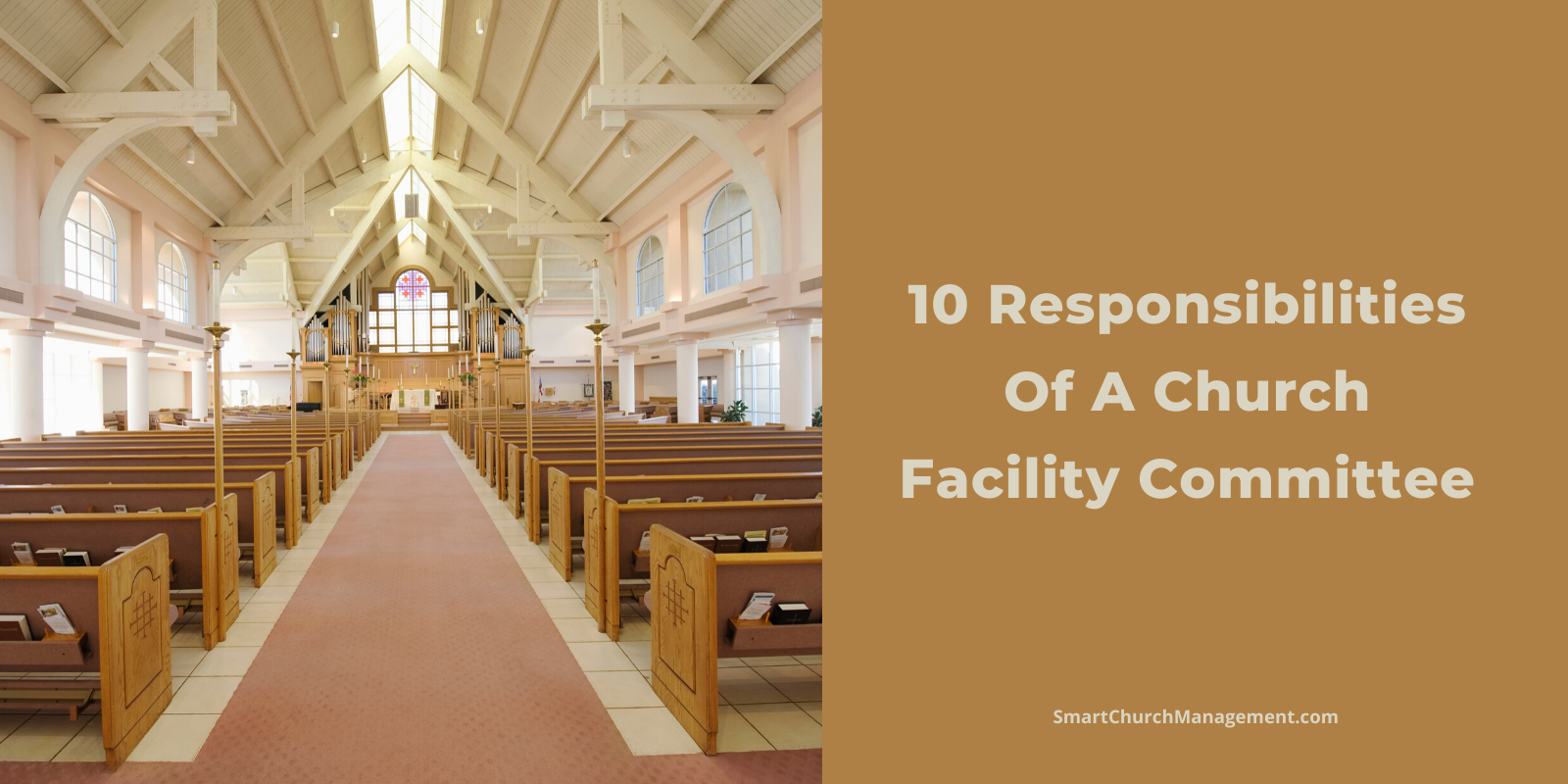Estimated reading time: 5 minutes
A church facility is where church happens.
And churches need facilities that are well-designed, equipped and maintained to fulfill their mission.
Managing church facilities requires budget dollars, planning, and an organized process to maintain and plan for its use.
Many churches use a team of people to make this happen.
Identify a core group of employees and volunteers passionate about the church and its facility.
Use this team to ensure that the campus is kept clean, maintained, and aesthetically pleasing for members and visitors.
This team often reports to the church board and may have some of the following responsibilities:
1. General System Maintenance
Maintaining a church campus keeps everything in working order.
Be proactive and maintain systems to ensure they function properly and are operational for the average life of the system.
For instance, if your HVAC system requires routine maintenance, work to create a schedule for that maintenance.
Make sure that it is maintained by a professional with the appropriate license, background, and training.
2. Custodial
Churches get a lot of use and need a structured plan to keep their facilities clean.
Create a cleaning schedule and train employees and volunteers on the proper way to clean and sanitize campus facilities.
Cleaning chemicals can be harmful so make sure anyone using cleaning products has had the proper training for handling, storing, and discarding those materials.
For example, when you hire a new custodian, provide a job description so they know exactly what it is that needs to be done, how often it needs to be done, and the measures you will use to gauge cleanliness.
3. Meeting Space Scheduling
Church campuses often have lots of gatherings and meetings.
Sometimes, there is a conflict regarding the use of campus facilities that need to be managed.
Develop a system to schedule classrooms, auditoriums, or church campuses.
The schedule will help to ensure there is the necessary facility support to assist with church activities and to eliminate duplicate booking of meeting space.
For instance, a campus calendar can ensure that someone is available to unlock and lock the doors before and after a wedding.
4. Campus Landscape
The first impression that a visitor has when driving onto a church campus is its landscaping.
Make a plan and recruit volunteers to help with the outdoor campus planting, trimming, weeding, and grass cutting.
For instance, schedule a campus clean-up event four times a year to clean out flower beds, plant trees, or trim the bushes.
If your church has the resources to hire a company to maintain campus grounds, work with the team to secure bids and negotiate contracts with landscape vendors.
5. Campus Aesthetics
Church campuses get lots of use and require constant evaluation to improve the look, flow, and feel of the campus.
This group is responsible for creating an aesthetically pleasing environment by making recommendations on furnishings, décor color themes, and signage for campus way-finding.

For instance, if the church is going through a remodel, this team helps to pick colors and interior furnishings that complement each other.
6. Facility Expansion
Healthy churches grow. And with growth comes expansion.
This team should be looking 5, 10, or 15 years down the road and help to create a plan for expansion when the appropriate time comes.
This may mean locating land to build on, identifying an architectural firm to help with the building design, or assisting in developing the expansion budget for a capital campaign.
7. Safety/Risk
The safety of members and guests should always be a priority.
This team should do routine safety checks of the campus to ensure there are no hazardous materials, equipment, or facility locations that could cause harm to someone.
For instance, during the winter months, this committee should have a plan for keeping parking lots and sidewalks clear of snow and ice.
8. Equipment And Systems
There are lots of equipment needs for a church campus. As well as building systems to maintain.
This team identifies equipment needs and ensures that all necessary items are available and in good working order.
For instance, if the church has a deep carpet cleaner, this team makes sure there are regular inspections and that the equipment is maintained and works properly.
9. Supporting Events
Church and events go hand in hand. And with events, there are many facility needs.
This team supports all church events by overseeing trained employees and volunteers who can manage set-up, tear-down, and perform general maintenance and custodial support for church events.
10. Facility Volunteer Management
It takes lots of volunteers to keep a church campus in good working order.
This team has responsibility for training and overseeing volunteers who help with facility-related projects.
For instance, if volunteers help with campus improvements, they need safety training on all equipment to safeguard against injury.
The facility review committee should meet on a regular basis and discuss strategies for managing church facilities, identify facility update needs, and plan for future expansions or remodels.
This committee should also meet with the budget review team to ensure large capital expenditures are budgeted, and resources are available when needed.
The care and maintenance of a church’s property can send a strong message to those who use it.
Don’t ever underestimate the impact a church facility has on its members and the community in which it resides.
An engaged and effective Facility Review Committee can be the secret to having a church campus to be proud of!
If you are a member of SCM, you can log in to your account here to access an editable copy of a Facility Review Job Description.
If you are not a member and would like access to editable copies of this document and all of our job descriptions, you can learn more here.



